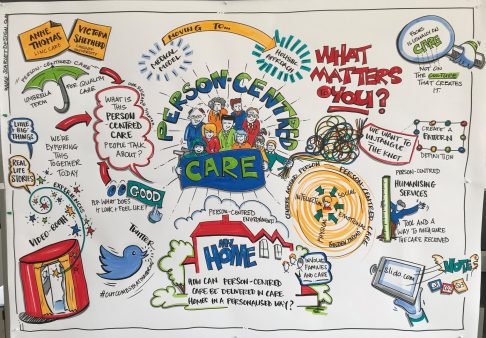Person-Centred Care In Care Homes – What Are The Outcomes That Matter?
9 July 2018
Person-Centred Care In Care Homes
Person-centred care has become firmly embedded in care home settings, policies, and guidance over that last two decades. NICE guidelines promote integrated and person-centred approaches, inspection frameworks for older adults evaluate whether timely, appropriate person centred care has been delivered, and new social care legislation introduced in Wales puts the individual and their needs at the centre of their care – talking about ‘what matters to you’. But there is ongoing uncertainty about what person-centred care actually is, and how those providing care in care homes can deliver and evidence person-centred care. Older people and care home staff themselves report that person-centred care is still not always being implemented.
A Research Priority
We conducted a study to identify the areas that are a priority for future research, and found that research into how person-centred care can best be delivered was the highest priority for care home staff. Following the study, a workshop was organised by the Centre for Trials Research and PRIME Centre Wales to bring together experts in Wales with an interest in care for the older person, to begin to develop research ideas collaboratively.
New Collaboration Is Formed

Following on from the event, we formed a collaboration with Anne Thomas (Executive Director, Linc Care) to explore these questions further. The first step was to organise an event to bring together a broad range of stakeholders to explore: what person-centred care looks like in practice, what the outcomes are that really matter to those receiving care, and what is in the way of achieving person-centred care.
An Interactive Day

We were delighted to welcome a large number of representatives from health boards, third sector organisations, care regulators, commissioners, researchers, care providers, and users of services (older person or a family member/supporter) to a very sunny Lysaght Institute in Newport. We encouraged delegates to share their experiences of care in care homes, hear about others’ experiences, and help generate consensus about what person-centred care actually is, and how we can provide the care that really matters to those who receive it.

During the day we used a number of interactive communication activities as a way of using creative approaches to explore a much talked about concept, including: visual maps, video booths to capture real-life stories, visual facilitation, and online audience interaction to gain consensus around important issues.
Key Messages About Person-Centred Care

Our interactive word cloud showed the importance to delegates of choice, dignity and respect when thinking about person-centred care in care homes. Other key messages that emerged from the day were: the importance of ‘knowing’ and building relationships which was described as a golden thread running through all elements of care; creating a culture of care and empowering carers to be able to provide person-centred care; and the need for asset-based approaches – attending to people’s strengths and not just their needs.
The topic of how to recognise and evidence person-centred care generated a great deal of discussion. It was very interesting to see how, despite a great deal of focus being on the importance of documentation in this sector, delegates thought that ‘how it feels’ and ‘what we see’ were more important indicators than documentation which tends to focus on needs and whether these have been met. Alternative formats for capturing these more elusive concepts are needed in order to more fully evidence that person-centred care has been delivered.
Next Steps
Our next steps are to summarise the rich discussions, illustrations, and ideas generated during the day, and use these as a next step towards ‘untangling the knot’ of person-centred care. We look forward to reporting more about this work in the future.
- April 2024
- March 2024
- December 2023
- November 2023
- September 2023
- July 2023
- June 2023
- April 2023
- March 2023
- February 2023
- December 2022
- November 2022
- October 2022
- September 2022
- August 2022
- July 2022
- June 2022
- May 2022
- April 2022
- March 2022
- February 2022
- January 2022
- November 2021
- September 2021
- July 2021
- June 2021
- May 2021
- March 2021
- February 2021
- December 2020
- November 2020
- September 2020
- August 2020
- July 2020
- January 2020
- December 2019
- October 2019
- September 2019
- July 2019
- June 2019
- May 2019
- April 2019
- February 2019
- December 2018
- November 2018
- October 2018
- September 2018
- August 2018
- July 2018
- June 2018
- May 2018
- April 2018
- March 2018
- December 2017
- October 2017
- August 2017
- July 2017
- June 2017
- May 2017
- April 2017
- March 2017
- February 2017
- January 2017
- December 2016
- October 2016
- August 2016
- June 2016
- April 2016
- March 2016
- February 2016